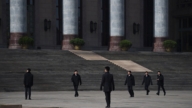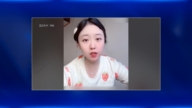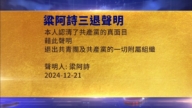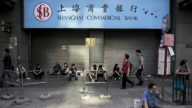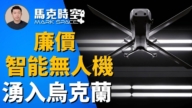【新唐人2012年11月15日讯】十八大期间,《人民日报》在同一篇文章里提到,“任何组织和个人都没有超越法律的特权”和“法治强调党的事业至上”,以及“党制定法律”,聼起来自相矛盾。不过,在中共执政的60年中,司法一直无法独立,而在当下的权力交接中,官方发出的这种论调,百姓们会再次相信吗?
近期大陆媒体罕见的就法制和司法公正问题连续发表文章。《人民日报》11月12号发表评论文章“社会主义法治强调党的事业至上”。
文中说,“社会主义法治坚持法律面前人人平等……任何组织和个人都没有超越宪法和法律的特权。”
但紧接着下一段却自相矛盾的说“社会主义法治强调的是党的事业至上、人民利益至上、宪法法律至上”。
在重庆打黑中被冤判的大陆知名刑辩律师李庄指出,所谓的“至上”破坏法的公平。
大陆刑辩律师李庄:“因为‘法’,它是一个铁面无私的东西,它是一个公平的代名词。如果你老体现谁谁谁的利益,体现谁谁谁的至上,那就失去了‘法’的一种公平,‘法’的概念就被破坏了。”
北京律师浦志强也对海外媒体表示,“三个至上”是互相矛盾的,最高点不可能同时有三个,说穿了就是只有党的利益至上,实际上,党最大的事业就是永保执政地位。
《人民日报》的文章还说“多党轮流执政、两院制和三权分立不适合中国国情”。而国内律师们指出,中国的法院目前是在政法委的控制下,公检法之间的制衡失效,这种制度无法给中国产生出独立的司法。
大陆维权律师刘晓原:“司法独立必须要三权分立。我们所说的‘独立’,实践中你也看得出来,司法是根本不可能独立的。他已经谈到了党的领导,公检法要受政法委的领导,这个是不可能做到独立的。如果涉及维稳的案件,涉及到政府职权的案件,司法碰这个就很难了。”
大陆维权律师唐荆陵:“你又没有监督,又没有政党的轮替。现在执政的,并且按照法律规定要永远执政的政党,万世一系的政党,它肯定要为所欲为的。‘绝对权力,绝对腐败’这是政治学上的一个真理。如果他坚持党对司法的管控的话,那就不可能有司法独立,也就不可能有公正。”
13号,《新华网》又报导了十八大新闻中心举行的,主题为“中国的司法公正”网络采访活动。最高人民法院常务副院长在回答问题时表示,古今中外的司法制度,都不可能完全杜绝冤假错案,中国的再审制度已经是最严的。
海外媒体分析,这是喉舌媒体在强调“党的事业至上”的同时,一方面又呼吁中国百姓要对司法抱有信心。
不过,网友对这篇新闻的留言,大多都是“拍砖”的意见。
有网友直说“中国的冤假错案其实不是人的问题,如果司法缺乏独立性,自然就缺乏公正性!”。
也有网友说“人情,利益,政绩和渎职造成的冤假错案。这是中国潜规则盛行的环境中的腐败,也是最不愿意承认和难以革除的毒瘤”。
采访/李莲 编辑/尚燕 后制/黎安安
China’s Judicial Justice: Under Supremacy of the Party’s Cause?
In the period of the 18th Party Congress,
the People’s Daily, published a paradoxical commentary.
The article stated “equality before rule of law”, “supremacy of
the Party’s cause”, and “the Party stipulates laws.”
In reality, China’s judiciary has never been truly independent
over the past 60 years.
The Chinese Communist Party has made such assertions
while holding its top power transition.
Will the Chinese public ever trust the Party again after this?
CCP official media has recently published a series of
articles about the rule of law and judicial justice.
On November 12, the People’s Daily’s commented on
“prioritizing the Party’s cause under socialist rule of law.”
The commentary said, “The socialist rule of law sticks to
equality before the law…….”
“No organization or individual has privilege above
the Constitution and laws.”
However, the article continued,
“The socialist rule of law puts the Party’s cause first, then
the interests of the people, then the constitution and laws.”
Li Zhuang, a lawyer known for being a victim of
Chongqing’s “anti-vice campaign”, comments.
The alleged “supremacy” actually ruins the impartiality of laws.
he says.
Li Zhuang: “The law is synonymous with impartiality.
If it’s always used to safeguard someone’s interests,
or to prioritize someone, it leads to a lack of impartiality
and destroys the whole concept of the rule of law.”
Beijing-based lawyer Pu Zhiqiang told overseas media that
CCP’s “three-supremacy” claim is contradictory.
The highest can only refer to one, instead of three.
The remark actually alludes to the Party’s interests that
always come first.
Maintaining its ruling status security forever is actually
the Party’s biggest cause, Pu Zhiqiang interprets.
The People’s Daily article stated, “The system of multi-party
rule, bicameral legislature and checks and balances does not conform to conditions in China.”
China’s lawyers affirmed that the existing judicial system is
controlled by the Political and Legal Affairs Committee(PLAC).
No checks and balances exist between public security organs,
procuratorates and courts, which gives no independent judiciary.
Liu Xiaoyuan: “Judiciary independence must be based on
checks and balances.
Currently in practice, there’s no judiciary independence at all.
The official media have clearly spoken of the leadership of
the Party, and the judiciary is under the lead of the PLAC.
If the case involves stability preservation or governmental
authority, the judiciary can hardly deal with it."
Tang Jingling (Human rights lawyer, China):
“There’s no supervision, no multi-party rule.
So the incumbent ruling party, which will rule China forever,
according to its law, will definitely do as it wants.
“Absolute power absolutely creates corruption,"
which is a universal truth in politics.
If the Party insists on controlling the judiciary,
you’ll never see an independent and impartial judiciary.”
On November 13, Xinhuanet.com covered online interviews
on the theme of “China’s judicial justice".
Vice executive president of the Supreme People’s Court
replied to some questions.
He said, a judicial system, at all times and in all countries,
never fully eliminates the possibility of unjust verdicts.
China has the most stringent retrial system in the world.
Overseas media commented that this is an official appeal
to the Chinese that have confidence in China’s judiciary.
Yet, this news was widely opposed by Chinese netizens.
one of whom posted, “China’s unjust verdicts were actually
not results made by people. No independent judiciary, no justice!”
Another netizen commented, “Unjust verdicts have been
consequences of personal connections,
along with private gains, political achievements
and dereliction of duty.
It’s a rot created by the prevailing hidden rules in China,
also a cancer that is most reluctantly admitted and hard to remove.”


